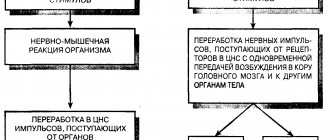The law of genetic poverty - Natalia Grace writes
The law of genetic poverty - Natalia Grace writes. Business coach and lecturer Natalya Grace in her book “Grace's Laws” very accurately identified one thing that programs us for poverty from childhood.
The Law of Genetic Poverty. Everyone should read about this:
“As children, at a classmate’s house, we often jumped on the sofa until adults saw. We were very pleased with the springs, which in some places came very close to the surface; I was delighted by the dust that flew from the sofa in clouds from our jumps. When twenty years later I went to see my childhood friend, I was horrified to see in the corner the same sofa on which we had once jumped.
It had not changed much, as far as I could remember, but now I was shocked by the poverty and squalor of the situation.
I mentally calculated how much it could cost to buy a new sofa, replace greasy chairs, and a mirror that was broken and sealed with chocolate wrapper. While we were talking, in my imagination I was whitewashing the ceiling and changing the wallpaper.
I wanted to wash the windows covered with flies, throw out the sticks and cardboard sticking out from under the sofa, the broken flower pot tied with a stocking.
“What if money is bad?” – I thought... But my brain resisted and suggested that I buy at least an inexpensive adhesive film in the color of wood and cover the table with it. Everywhere I looked, my gaze came across some kind of damage, dirt, stains and debris. My brain suddenly said to me: “Why do you think there is always dirt next to poverty?” Now I ask you the same question.
Even if you replace the word “always” with “almost always” or “often”, it doesn’t make it any easier. Dirt is not a manifestation of lack of money, but of mentality. Think about it: dirt is a manifestation of the corresponding mentality. And since dirt and poverty are neighbors, poverty is a kind of mentality. Yes, poverty is in an unwashed head.
At school I had an amazing literature teacher, Tamara Grigorievna, of extraordinary intelligence, a very insightful woman. She once dropped a phrase that I remembered for the rest of my life. Someone asked her what philistinism means, and she answered: “Philistinism means drinking from an old shabby mug when a new one is in the sideboard.” T
As is customary in many Russian homes: money is put aside for a rainy day, a new cup stands in the sideboard for a rainy day, only a white day rarely comes, and all life is filled with black ones.
For those who live in anticipation of the future, it never comes. And then I realized this: it’s a shame to be a beggar; It's a shame to be dirty. It’s a shame to have devastation in your head, which inevitably affects both the home and the mentality of children.
I know one woman who saved money for more than twenty years to buy a dacha. She raised two daughters alone. The girls lived from hand to mouth, on nothing but porridge, and the eldest of them told me how ashamed she was to go out into the yard in old corduroy trousers with patched knees.
The girl grew up, and every year her pants magically grew. The fabric folded underneath unfolded, centimeter by centimeter.
It was not as faded as the rest of the trouser leg, and this betrayed the beggar's cunning. Apparently, this is where the expression comes from: “The need for invention is cunning.”
It’s not worth telling that the system in the state does not allow you to earn enough. I don’t criticize the system, but the rot in the brain.
With the same money you can look decent or beggarly.
When the mother finally bought a dacha, both grown-up daughters did not have the slightest interest in this dacha, but endlessly reproached their mother for not teaching them what it meant to be a woman. The girls have developed a Cinderella complex.
They, accustomed to seeing worn-out chairs and old dishes, shabby towels and coats from seven years ago, later, as adults, were afraid to spend money on themselves.
Every time they bought something, their mood deteriorated: they seemed to feel unworthy of new good things. This, my friends, is called in two words: genetic poverty. She is already in consciousness, in cells, in blood, in bones.
Children who see shabby corners are subconsciously programmed for poverty. Already in adolescence they begin to realize its severity. Anton Pavlovich Chekhov noted that shabby walls and dirty corridors have a bad effect on a student’s ability to learn.
Dirt and poverty suppress a person, the habitual appearance of a wretched environment programs him to be a loser. You could object to me that hatred of poverty stimulates some people to develop and earn money, but I will answer you that many more people break under the unbearable burden of poverty.
The words “trouble” and “poverty” have the same root. Drive away trouble from yourself. Drive away poverty. I really like the phrase: “Wealth is a state of mind . So, poverty is also a state of mind.”
It's a shame to spend money on yourself
This belief is most often born in the heads of those young people who were limited by adults in every possible way in childhood. For example, when her daughter asked her to buy a doll, her mother systematically answered: “We don’t have money.” Gradually the child gets used to this situation, and even stops asking for what he wants. What's the point of this?
Then it becomes even sadder: as such people grow up, they do not become happier. They live with endless expectations, but in reality they do not get closer to what they want. Buying a beautiful fur coat is expensive, that’s why we’ve been wearing the same down jacket for five years, trying to save as much as possible. This is what genetic poverty is.
Why aren't you destined to get rich? If you are thinking about this question, then it’s time to analyze your childhood. Destructive beliefs are already contained in your cells, bones, blood.
The Law of Genetic Poverty (Natalia Grace)
Natalya Grace is a wonderful specialist in the field of psychology, a successful lecturer, TV show host, and author of various personal growth trainings.
Her seminars address important issues: how to achieve financial well-being, what the law of genetic poverty is and how it arises in the human mind.
Her methods for attracting money into their lives are incredibly popular with the audience: more and more people are thinking about the causes of poverty and want to become rich, wealthy, and successful.
One cannot but agree that it is financial independence that gives complete freedom. However, in a person’s mind, sometimes from childhood the idea is firmly established that he is not worthy of money, that money is obtained through hard labor.
As Natalia Grace’s practice shows, such beliefs are nothing more than prejudices that prevent you from realizing your bold dreams. The author identifies four causes of genetic poverty that prevent self-realization in the full sense of the word.
They are based on the individual’s thinking, attitude towards oneself and the way of perceiving the surrounding reality. In this article we will also look at other factors that influence human consciousness.
What is the law of genetic poverty?
According to the universal mechanism, we are designed in such a way that we absorb information from the environment in which we find ourselves for a long time. A bad beginning affects us in the same way as a good one, leaving its indelible marks for the rest of our lives.
Let's imagine a situation: a child is growing up in a family. He has an individual character, traits inherent to him alone.
But at the same time, he is very susceptible to influence from the outside: parents, school, and the social environment put their ideas and beliefs into the little person.
And if the family is poor for some reason, there is a high probability that the child will grow up inclined towards poverty - he has absorbed these beliefs, they have become his ideas.
Natalia Grace identifies 4 causes of genetic poverty. They, she believes, contain the basic patterns that do not allow a person to get rich, even if he works tirelessly for quite a long time.
Family situation
There are families in whose apartment there is a downright miserable atmosphere. This fact has a negative impact on the minds of the younger generation. The child’s consciousness is structured in such a way that he, like a sponge, absorbs the worldview of his parents: how they act in certain situations, what they think about life and what they talk about.
If the father and mother do not take care that the room where the baby lives is clean and orderly, then there is no need to expect the child to grow up neat.
Dirty dishes left in the sink all day, peeled wallpaper, dust covering the furniture - all this does not have the best effect on the child’s worldview and value system. He gets used to it, and then he won’t even think that everything could be different.
It has long been noted that dirt is a constant companion to poverty. Note that you don’t even want to bring anything new to an uncleaned apartment full of trash and dust.
It's a shame to spend money on yourself
This belief is most often born in the heads of those young people who were limited by adults in every possible way in childhood. For example, when her daughter asked her to buy a doll, her mother systematically answered: “We don’t have money.” Gradually the child gets used to this situation, and even stops asking for what he wants. What's the point of this?
Then it becomes even sadder: as such people grow up, they do not become happier. They live with endless expectations, but in reality they do not get closer to what they want. Buying a beautiful fur coat is expensive, that’s why we’ve been wearing the same down jacket for five years, trying to save as much as possible. This is what genetic poverty is.
Why aren't you destined to get rich? If you are thinking about this question, then it’s time to analyze your childhood. Destructive beliefs are already contained in your cells, bones, blood.
Restrictions
In Soviet times, it was customary in many homes to store things “just in case.” On the balcony there were deposits of various items that had long gone out of use. The worldview of a Soviet person is that of a beggar.
His vision was previously limited by endless regulations and prohibitions, many products were in short supply. Now is a completely different time.
So why are we still afraid to give up the illusion of calm and stability, which has not actually made people happy?
By cursing the current time and the current state of affairs, people deprive themselves of the opportunity to accept the existing position. To be successful today, you don’t just need to work hard from morning to night, as it was before.
It is necessary to act with concentration and purpose: this is the only way to achieve any desire. But people accustomed to constant savings find it difficult to believe that all aspirations will be rewarded. The law of genetic poverty does not allow you to move on to financial well-being.
People get used to denying themselves even what they need, and this becomes the norm in their lives.
Subconscious programming
What makes a person poor is not the lack of money as such, but the fear of spending it on one’s whims. When parents refuse to buy a small child a new toy, what do you think the child feels? Annoyance, resentment, regret.
When this experience is repeated many times, the child begins to feel that he is not worthy of expensive gifts. It has been noted that if you say the words “expensive, we can’t afford this” every day in front of a child, he will lose faith in his own capabilities.
This is what Natalia Grace talks about.
The law of genetic poverty states: personality is formed in early childhood. Motivation and the desire to act determine 90 percent of our income.
Accordingly, a lot in our lives depends on the efforts made. On the website “Genetic Poverty adme.
ru" you can read the description of examples of how we program ourselves for failure, where human self-doubt comes from.
Who is guilty?
The human psyche is structured in such a way that in unforeseen cases that are negative in nature, it always looks for someone to whom it can shift responsibility for failures. That is, if, for example, you cannot earn more money, then the family, husband, or anyone is to blame.
In fact, this is a departure from reality, and only a few are able to truly understand sensibly what is happening to them. The thing to remember is that excuses are the words spoken by a loser. We can hide behind endless depressions and doubts, but this will not make life any easier.
Factors holding back success
Sometimes it happens that we want to achieve some goal. But there are a number of reasons why this goal cannot be achieved. The first thing worth noting is ignorance of your purpose. It happens that a person is already over 40 years old, but he has not chosen the desired goal for himself. This episode is no exception, this is how most people live, and only a small percentage reaches the truth.
The next point is fear of action. It occurs when a person seems to know what he wants to achieve in life, but does not take any steps to ensure that his desires become reality. Inability to handle money also contributes to internal stagnation.
Some people mistakenly believe that certain life conditions must occur for action to take place. But it should be noted that ideal circumstances never exist! You just need to know what you want and go for it, no matter how hard it may be.
Genetic poverty arises where there is self-doubt, a habit of living without planning or analyzing.
Mutually motivating relationship between money and dreams
As the author rightly notes, a person believes only with an eye to the past. If a person has had many sad experiences related to money in his life, it will be difficult for him to accept certain things in the future. This is how genetic poverty is formed.
Grace clearly demonstrates to her students at seminars that money is a tool for achieving a goal, but not the goal itself. Yes, the means can be an excellent soldier, but nothing more. Therefore, it is not money that makes us happy, but the opportunities that it opens.
And then only if a person expresses a willingness to act in accordance with his abilities, which does not always happen. You can’t jump over your head, no matter how banal it may sound.
When there is a dream in the heart, it itself is ready to lead us. All that is needed is the permission of the individual herself and her desire to act in accordance with her goal.
Self-discipline
The ability to organize your time is one of the key points towards success. If you find it difficult to simply force yourself to complete a necessary task, this is the path of failure. Self-organization is important precisely because time is the only irreplaceable resource. You can always earn money, but unfortunately, an adult does not gain more strength and energy every year.
To achieve success, we need to be clear about what we want to get as a result. For this, self-organization plays a key role; it leads to victory.
Everything matters: the time of awakening, the efforts spent, helping someone, the actions performed. You need to live with specific desires and take certain actions to solve a significant problem. The only way.
Ephemeral fantasies do not work and do not come true.
You can't live waiting for the future
The sages know that only the present moment has the highest value - this is our real opportunity to improve ourselves. The realization of a person's abilities and potential begins where the intention is formulated.
Anyone who dreams of a bright future and does nothing is like a windmill - he fights with illusions. Genetic poverty is insidious in that a person often does not notice it. He is trying to take some actions that are actually false and incorrect.
And then, in indelible bitterness, he asks himself why nothing works out.
Wealth is a state of mind
A wealthy person is not one who currently has a lot of money, but one who can increase his capital and strives for self-development and self-improvement. The best investment is an investment in yourself, in education, in creative potential.
The law of genetic poverty only applies to those who are afraid to take risks, try new things, and are focused on old behavior patterns. Every person can change their life for the better.
To do this, you need to clearly understand what needs to be done, what steps to take.
Thus, the causes of genetic poverty should be sought in early childhood. It is there that all the mechanisms that we put into action with our thoughts, feelings, and emotions are concentrated.
How to change your life for the better? Is it possible to stop hoping, believing, striving for what you want? Yes, we need to act. But everything requires a competent approach. You need to learn to listen to yourself, your heart.
When a person has highly developed intuition, it is very difficult to deceive him.
Family situation
There are families in whose apartment there is a downright miserable atmosphere. This fact has a negative impact on the minds of the younger generation. The child’s consciousness is structured in such a way that he, like a sponge, absorbs the worldview of his parents: how they act in certain situations, what they think about life and what they talk about.
If the father and mother do not take care that the room where the baby lives is clean and orderly, then there is no need to expect the child to grow up neat. Dirty dishes left in the sink all day, peeled wallpaper, dust covering the furniture - all this does not have the best effect on the child’s worldview and value system. He gets used to it, and then he won’t even think that everything could be different. It has long been noted that dirt is a constant companion to poverty. Note that you don’t even want to bring anything new to an uncleaned apartment full of trash and dust.
Law of Genetic Poverty
Today, the phrase “the law of genetic poverty” is becoming increasingly common on the Internet. People are interested in what the causes of poverty may be, what are its origins, and why many people do not even try to become more successful and rich in their lives, but, on the contrary, are increasingly mired in their poverty and hopelessness.
The term “genetic poverty” belongs, of course, not to me, but to business coach Natalya Grace, who quite reasonably believes that people themselves unconsciously program themselves for poverty and failure. And most of the reasons for this come from childhood.
The main law of poverty
For example, Natalya is sure that the first law and companion of poverty is always dirt . Remember the rubble in closets and pantries, balconies filled with broken or simply unnecessary things, bales of clothes that you will never wear again.
And all this rubbish is called in one meaningful word - “useful.”
As children, we often observed this in the apartments of our parents and grandparents.
One can understand them: they lived in conditions of terrible scarcity, when even for the most seemingly simple thing that can be found in any store today, one had to stand in line for days.
In this situation, it was short-sighted to throw away old things. Therefore, I had to keep used clothes, update them in one way or another, change them for children, and then, when they began to fall apart in my hands, use them on rags to wash the floor. Every item was used inside and out.
My grandmother even has a favorite phrase from those times: We made “something” out of “nothing.” As they rightly say, “the need for invention is cunning.”
Dirt is a companion of poverty
Now the realities of life, fortunately, have changed, but the habit of hoarding, “Plyushkin syndrome” or the psychological poverty we are discussing has been passed on, as if by genes, to the next generation.
Instead of throwing away a torn, stained T-shirt and buying a new one for 100 rubles, we keep the old one - it will come in handy. Whether to go home, or to tinker at the dacha...
And this seems logical, but now there is no room for new things in our house! The piles of dusty rubbish have become so firmly established in our lives that they have become part of the mentality of almost everyone who was born in the union, and this is precisely what hinders our further development.
Living in anticipation of the future
Probably everyone will remember a large sideboard - the pride of any Soviet family, which occupied an honorable place in the parental home. In the sideboard, usually on the top shelf, there was a brand new porcelain service: plates, saucers, cups, a teapot... The service was taken from this shelf no more than twice a year (or even less) - only for a very serious reason.
For example, when people came to visit, in front of whom the hostess did not want to lose face. After receiving guests, the dishes were lovingly wiped with a cloth and put back until the next time.
Family members were strictly forbidden to take a good plate if they could eat from an old, worn one with a chipped edge.
This rule is so imprinted in the minds of children that, having matured, many stubbornly continue to follow it, believing that in order to wear beautiful, clean clothes, use good things, have a tasty and originally decorated lunch, a special occasion is needed, which will come “sometime in the future.”
Our mother’s stern voice still rings in our heads: “Why did you wear a new skirt to school? Put on the old one, and this one will go to some holiday! Put caviar and tangerines - it’s for the New Year!”
It turns out that in order to start changing your life for the better, you also need to wait for some vague “special occasion”?
And, in fact, it is precisely this life of waiting for the future that will most likely end with the fact that the bright future will never come, and in old age it will smoothly pass into the dark, hopeless past.
It's a shame to spend money on yourself
Today you can often hear the phrase from people: “I feel sorry for spending money on myself.” Then this belief is smoothly transferred to loved ones and children. Since childhood, the thought has been firmly ingrained in the subcortex of our brain: “There is no money.” It's not hard to guess where it came from.
-Mom, buy me ice cream!
-No money left.
-Dad, buy me a bike!
-No money left.
- We have money in an envelope in the top drawer of the chest of drawers!
-This is for a rainy day! What if something happens, what will we do then?
After such a childhood and upbringing, how can you start thinking about investing in yourself if there is always no money? And to be completely honest, this money is there, but always for some other, supposedly very important and necessary things. They are not there only for “your whims,” and often for your real growth, which, accordingly, will also never begin.
And even though we are no longer children, we often still believe that we have no money. And if there is, then we are simply not worthy of spending it on ourselves. Why buy new things if the old ones are still more or less intact? Why go to the gym when you can work out at home? Why buy expensive and high-quality products if you can fill your stomach with cheap chemical mud?
Many women have beautiful dresses hanging in their closets for years that they could not resist purchasing. These dresses were worn once, or perhaps not worn even once, because the woman feels guilty for this “eccentric” purchase.
https://www.youtube.com/watch?v=4osljVeXGkQ
Every time, approaching the wardrobe to put on a dress, a woman seems to hear a reproaching voice: “Are you getting rich?” And this despite the fact that the dress was bought for pennies on sale.
What makes us poor is not the lack of money, but the fear of spending it on “our whims” when we “could have put aside our finances for something more important, you never know, maybe even for a rainy day.”
Although it seems to me that if you wait so stubbornly for a rainy day, the white one may never come.
And again, this genetic law of pathological poverty, drilled into us in childhood, can ruin our further growth and prosperity, because before we never even thought about how to become rich and happy.
Programming the subconscious for poverty
They say that children do not listen to their parents' words, remembering only what they see with their own eyes. Mom and dad can repeat to the child hundreds of times a day: “When you grow up, you will be rich!”, but he will ignore these inspired speeches.
Meanwhile, old wallpaper hanging in shreds on the walls, worn floors covered with flies and cracked windows, somehow sealed with tape or tape, will every day more and more convincingly convince the little man that his fate is to be a beggar.
And the lack of desire in parents to make their lives better, the lack of specific actions aimed at this goal, every day, hidden and incomprehensible to the parents themselves, programs the child’s subconscious for poverty and forces them to believe that living in poverty and dirt is absolutely normal and natural.
Causes of genetic poverty
ActionTeaser.ru - teaser advertising But if parents sufficiently understood child psychology, they would know that the lifestyle of parents is always an example to follow.
For children, mom and dad have maximum authority, and everything they do automatically becomes correct.
If the family was initially dominated by an environment of poverty and decline, then, according to the law of “genetic poverty,” this infection will spread to the children’s heads.
Therefore, if the father studied at school with C grades, and then immediately went to work as a construction worker as a laborer, his words “study, son, get a higher education” are an empty phrase for the child .
Indeed, why study if your parents didn’t do it and live in peace? Why put in extra effort if you don’t see what result it can lead to? There is no example to follow! And why, if parents insist that striving for success is good, do they not strive for it themselves? There is clearly some kind of catch here!
Living in dirt and poverty, while explaining to a child what a rich, bright life is, is just as absurd as arguing that alcohol is harmful, holding a bottle of vodka in your hands and at the same time barely standing on your feet. Which, by the way, I also saw such “educators” in families a couple of times.
And it is natural that, having matured, we unconsciously repeat the lives of our parents, since we are simply not familiar with other scenarios. For a person constantly locked in a closet, there is no world outside of it.
Also, for a person who grew up in poverty, there is no better life, unless the parents, of course, bothered to start positive changes first of all with themselves, trying to break this vicious circle of genetic poverty.
Restrictions
In Soviet times, it was customary in many homes to store things “just in case.” On the balcony there were deposits of various items that had long gone out of use. The worldview of a Soviet person is that of a beggar. His vision was previously limited by endless regulations and prohibitions, many products were in short supply. Now is a completely different time. So why are we still afraid to give up the illusion of calm and stability, which has not actually made people happy?
By cursing the current time and the current state of affairs, people deprive themselves of the opportunity to accept the existing position. To be successful today, you don’t just need to work hard from morning to night, as it was before. It is necessary to act with concentration and purpose: this is the only way to achieve any desire. But people accustomed to constant savings find it difficult to believe that all aspirations will be rewarded. The law of genetic poverty does not allow the transition to financial well-being. People get used to denying themselves even what they need, and this becomes the norm in their lives.
Subconscious programming
What makes a person poor is not the lack of money as such, but the fear of spending it on one’s whims. When parents refuse to buy a small child a new toy, what do you think the child feels? Annoyance, resentment, regret. When this experience is repeated many times, the child begins to feel that he is not worthy of expensive gifts. It has been noted that if you say the words “expensive, we can’t afford this” every day in front of a child, he will lose faith in his own capabilities. This is what Natalia Grace talks about.
The law of genetic poverty says: personality is formed in early childhood. Motivation and the desire to act determine 90 percent of our income. Accordingly, a lot in our lives depends on the efforts made. On the website “Genetic Poverty adme.ru” you can find a description of examples of how we program ourselves for failure, where human self-doubt comes from.
Mutually motivating relationship between money and dreams
As the author rightly notes, a person believes only with an eye to the past. If a person has had many sad experiences related to money in his life, it will be difficult for him to accept certain things in the future. This is how genetic poverty is formed. Grace clearly demonstrates to her students at seminars that money is a tool for achieving a goal, but not the goal itself. Yes, the means can be an excellent soldier, but nothing more. Therefore, it is not money that makes us happy, but the opportunities that it opens. And then only if a person expresses a willingness to act in accordance with his abilities, which does not always happen. You can’t jump over your head, no matter how banal it may sound.
When there is a dream in the heart, it itself is ready to lead us. All that is needed is the permission of the individual herself and her desire to act in accordance with her goal.
You can't live waiting for the future
The sages know that only the present moment has the highest value - this is our real opportunity to improve ourselves. The realization of a person's abilities and potential begins where the intention is formulated. Anyone who dreams of a bright future and does nothing is like a windmill - he fights with illusions. Genetic poverty is insidious in that a person often does not notice it. He is trying to take some actions that are actually false and incorrect. And then, in indelible bitterness, he asks himself why nothing works out.
But I know for sure
That by doing all this, we deprive ourselves of some elusive pleasure in life. If you want, then we steal something from ourselves. Therefore, genes are genes, and I plan to consciously change. Through the replacement of habits, through prohibitions on buying what ALREADY is, through conscious consumerism and the use of ceremonial sets and tablecloths. And then, ironically, something in life will also change for the better, and my children, who grew up in a well-fed time, will not become carriers of this gene of fear for the future. The poverty gene.
My dears! Thanks for reading. I will be very grateful if you share this article on your social networks or leave a comment.
PS If you need individual advice, please contact us! Details are here.
Did you like the article? To avoid losing sight of the blog, subscribe to the news! This can be done in the right column or by becoming a member of my groups on Facebook or Instagram (links also in the right column).
PPS I run a channel on YouTube, where I briefly, for 10-20 minutes, answer your questions (they can be asked under any post)
Main photo source: Clem Onojeghuo on Unsplash
Factors holding back success
Sometimes it happens that we want to achieve some goal. But there are a number of reasons why this goal cannot be achieved. The first thing worth noting is ignorance of your purpose. It happens that a person is already over 40 years old, but he has not chosen the desired goal for himself. This episode is no exception, this is how most people live, and only a small percentage reaches the truth.
The next point is fear of action. It occurs when a person seems to know what he wants to achieve in life, but does not take any steps to ensure that his desires become reality. Inability to handle money also contributes to internal stagnation. Some people mistakenly believe that certain life conditions must occur for action to take place. But it should be noted that ideal circumstances never exist! You just need to know what you want and go for it, no matter how hard it may be. Genetic poverty arises where there is self-doubt, a habit of living without planning or analyzing.
Self-discipline
The ability to organize your time is one of the key points towards success. If you find it difficult to simply force yourself to complete a necessary task, this is the path of failure. Self-organization is important precisely because time is the only irreplaceable resource. You can always earn money, but unfortunately, an adult does not gain more strength and energy every year.
To achieve success, we need to be clear about what we want to get as a result. For this, self-organization plays a key role; it leads to victory. Everything matters: the time of awakening, the efforts spent, helping someone, the actions performed. You need to live with specific desires and take certain actions to solve a significant problem. The only way. Ephemeral fantasies do not work and do not come true.
Who is guilty?
The human psyche is structured in such a way that in unforeseen cases that are negative in nature, it always looks for someone to whom it can shift responsibility for failures. That is, if, for example, you cannot earn more money, then the family, husband, or anyone is to blame.
In fact, this is a departure from reality, and only a few are able to truly understand sensibly what is happening to them. The thing to remember is that excuses are the words spoken by a loser. We can hide behind endless depressions and doubts, but this will not make life any easier.
Wealth is a state of mind
A wealthy person is not one who currently has a lot of money, but one who can increase his capital and strives for self-development and self-improvement. The best investment is an investment in yourself, in education, in creative potential. The law of genetic poverty only applies to those who are afraid to take risks, try new things, and are focused on old behavior patterns. Every person can change their life for the better. To do this, you need to clearly understand what needs to be done, what steps to take.
Thus, the causes of genetic poverty should be sought in early childhood. It is there that all the mechanisms that we put into action with our thoughts, feelings, and emotions are concentrated. How to change your life for the better? Is it possible to stop hoping, believing, striving for what you want? Yes, we need to act. But everything requires a competent approach. You need to learn to listen to yourself, your heart. When a person has highly developed intuition, it is very difficult to deceive him.











